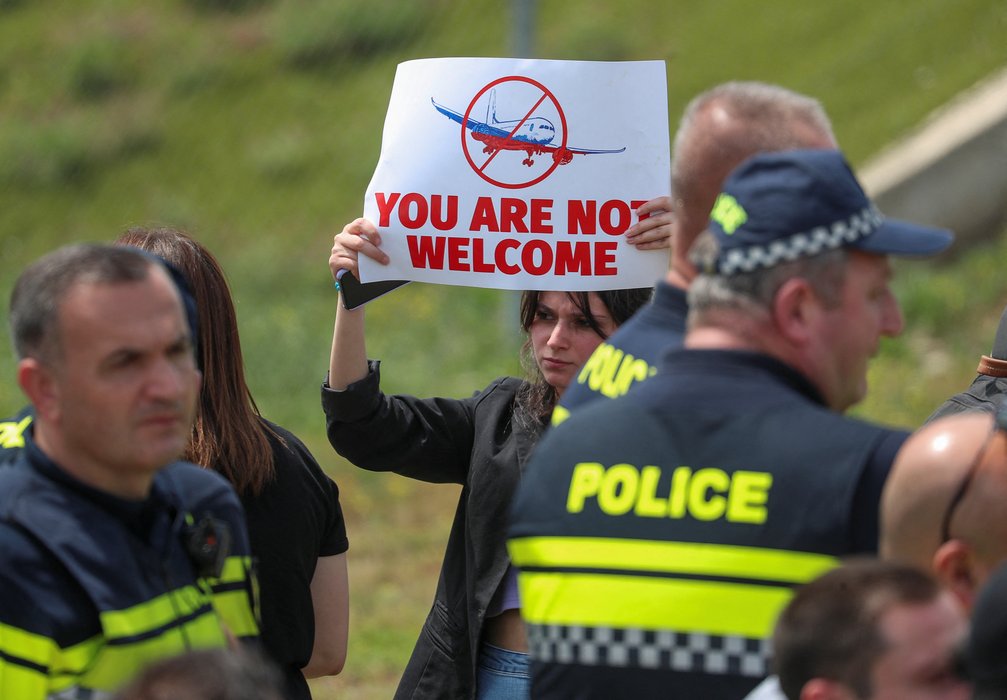
Freedom of association
EU-Georgia Civil Society Platform expresses concerns about smear campaign directed against civil society
In June 2023, the EU-Georgia Civil Society Platform (CSP) issued a joint declaration on Georgia’s progress in the reforms requested by the EU. The CSP was established under the Association Agreement between the European Union and Georgia with the aim of supporting the country’s European aspirations. In their statement, platform members expressed concern about the “prolonged discrediting campaign against civil society” present in the country. While they welcomed the government’s withdrawal of the so-called “foreign agents law” (see previous CIVICUS Monitor update), they also emphasised the need for a public debate when considering significant legislative acts in the future.
Freedom of peaceful assembly
Protests in Tbilisi as Georgia re-establishes diplomatic relations with Russia
On 10th May, Russian President Vladimir Putin signed a decree introducing visa-free travel for Georgian citizens and lifting the ban on Russian airlines flying to Georgia, signalling a return to normal relations between the two countries after more than four years. Russia had cut direct air links between the two countries in 2019 after massive anti-Russian protests in Tbilisi. The protests took place after Sergei Gavrilov, a member of the Russian Duma from the Communist Party, gave a speech in the Georgian parliament about the countries’ “Orthodox brotherhood.” Russia is seen as an aggressor state in Georgia, especially after the seven-day war in August 2008, as a result of which Moscow unilaterally recognised the independence of two regions: Abkhazia and South Ossetia.
On 19th May, a Russian plane landed at the International Airport in the Georgian capital for the first time in four years, carrying 70 passengers. Russian propaganda eagerly spread this news, portraying it as a long-awaited thaw in relations between the two "friendly countries" Georgian citizens, however, expressed their displeasure at the rapprochement with Moscow. They demanded the suspension of flights to and from Russia, as well as a more critical attitude towards the country they consider an aggressor. Around 200 people gathered at the airport, where the travellers arriving by plane were received with strong words. According to media reports, at least six people were detained.
Notably, children of Russian officials were among the guests, further fueling public opposition to the decision to resume flights between Russia and Georgia. At least 16 people were detained in the eastern Georgian town of Kvareli, as they staged a protest in front of the hotel where the guests were the daughter of Russian Foreign Minister Sergey Lavrov was reported to be staying with her family.
Among the arriving passengers were children of Russian officials, further fuelling public opposition to the decision to resume flights between Russia and Georgia. On 21st May, at least 16 people were arrested in the eastern Georgian town of Kvareli while protesting outside the hotel where the daughter of Russian Foreign Minister Sergei Lavrov was staying with her family.
Freedom of expression
Freedom House Report: the Independent Media rating in Georgian declined from 3.50 to 3.25
According to Freedom House’s 2023 "Nations in Transit” report, Georgia has fallen down the rankings this year. While the country is still classified as a "transitional or hybrid regime", as it was in the last edition of the report, Georgia's score dropped from 3.07 to 3.04. The biggest change was in the Independent Media score, which dropped from 3.5 to 3.25. This change is due to increased pressure on journalists from opposition TV stations, the imprisonment of some journalists known for their critical stance – including Nika Gvaramia from the Mtavari Arkhi TV station – and other cases of attacks and pressure on media representatives.
The report also highlights the recent attempt to pass the so-called "foreign agents law,” which would have significantly restricted civil society activities in Georgia. However, the score in the "Civil Society" chapter remained unchanged. As Civil.ge notes, this is because NGOs in Georgia have remained very active despite the restrictions, and have continued to monitor and participate in reform processes.
Chechen journalist denied entry into Georgia with no explanation
On 9th May, dissident Chechen journalist Shalavdi Geriyev, who was tortured in Russia and spent three years in prison, was refused entry to Georgia. He accused the Georgian authorities of being unprofessional and discriminatory towards people from the North Caucasus. Geriyev said that when he arrived in Tbilisi from Budapest, border officials made him wait while they checked his papers, after which he was called into a room and told that he would be refused entry to Georgia. No official reason was given for the refusal.
Natia Kapanadze, the director of the Media Ombudsman, a Georgian media advocacy group, condemned the authorities' action, calling it evidence of the government’s discriminatory practices against Ukrainian journalists and journalists critical of Russia. Geriyev plans to appeal the decision together with the local human rights organisation Georgia Rights. The Georgian Interior Ministry declined to comment on Geriyev's case, saying it was “up to individual border officials to explain the reasons for their decision,” and adding that "everyone has the opportunity to appeal."